ADAPTIVE TRIAL DESIGNS IN ONCOLOGY: LEVERAGING REAL-WORLD EVIDENCE FOR ACCELERATED DRUG APPROVALS
HOME
BLOG
ADAPTIVE TRIAL DESIGNS IN ONCOLOGY: LEVERAGING REAL-WORLD EVIDENCE FOR ACCELERATED DRUG APPROVALS
The field of oncology has seen significant advancements in drug development, with adaptive trial designs and real-world evidence (RWE) playing pivotal roles in accelerating drug approvals. Traditional randomized controlled trials (RCTs), while considered the gold standard, often pose challenges such as lengthy timelines and high costs. Adaptive trial designs offer a more flexible, efficient approach, allowing modifications based on interim data while maintaining scientific rigor. This article explores how adaptive designs, coupled with RWE, can streamline oncology drug approvals and improve patient outcomes.
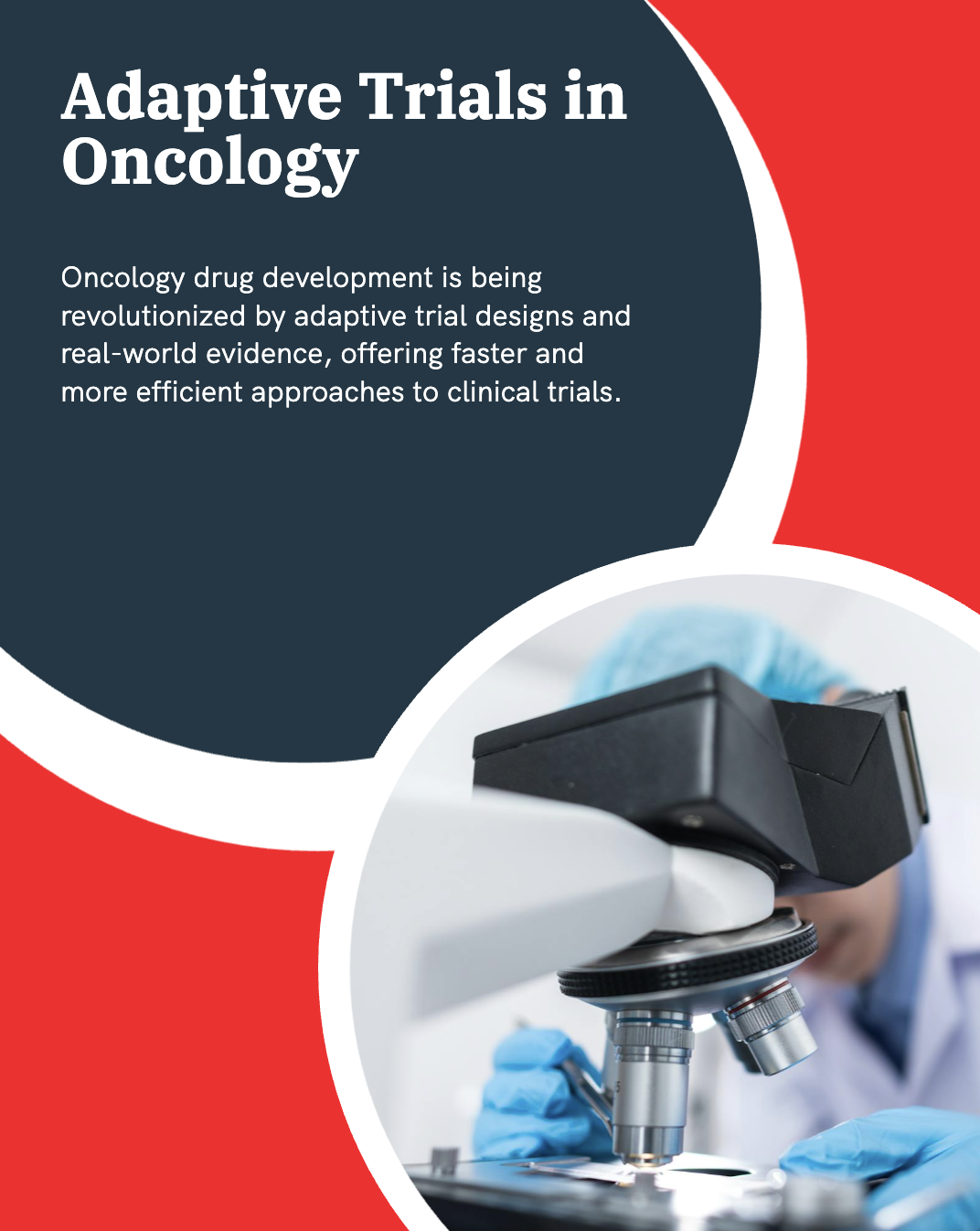
Understanding Adaptive Trial Designs in Oncology
What Are Adaptive Trial Designs?
Adaptive trial designs allow modifications to trial protocols based on accumulating data without compromising integrity or validity. Unlike conventional trials with fixed parameters, adaptive designs enable:
- Early Stopping for efficacy or futility
- Seamless Phase Transitions between trial stages
- Sample Size Adjustments to optimize statistical power
- Dose Optimization based on patient responses
Why Are Adaptive Designs Important in Oncology?
Oncology trials face unique challenges due to:
- Heterogeneity of Cancer (varying responses across subpopulations)
- Urgency for Effective Treatments (life-threatening conditions)
- High Attrition Rates (due to disease progression)
Adaptive designs offer a patient-centric, cost-effective solution that aligns with precision medicine principles.
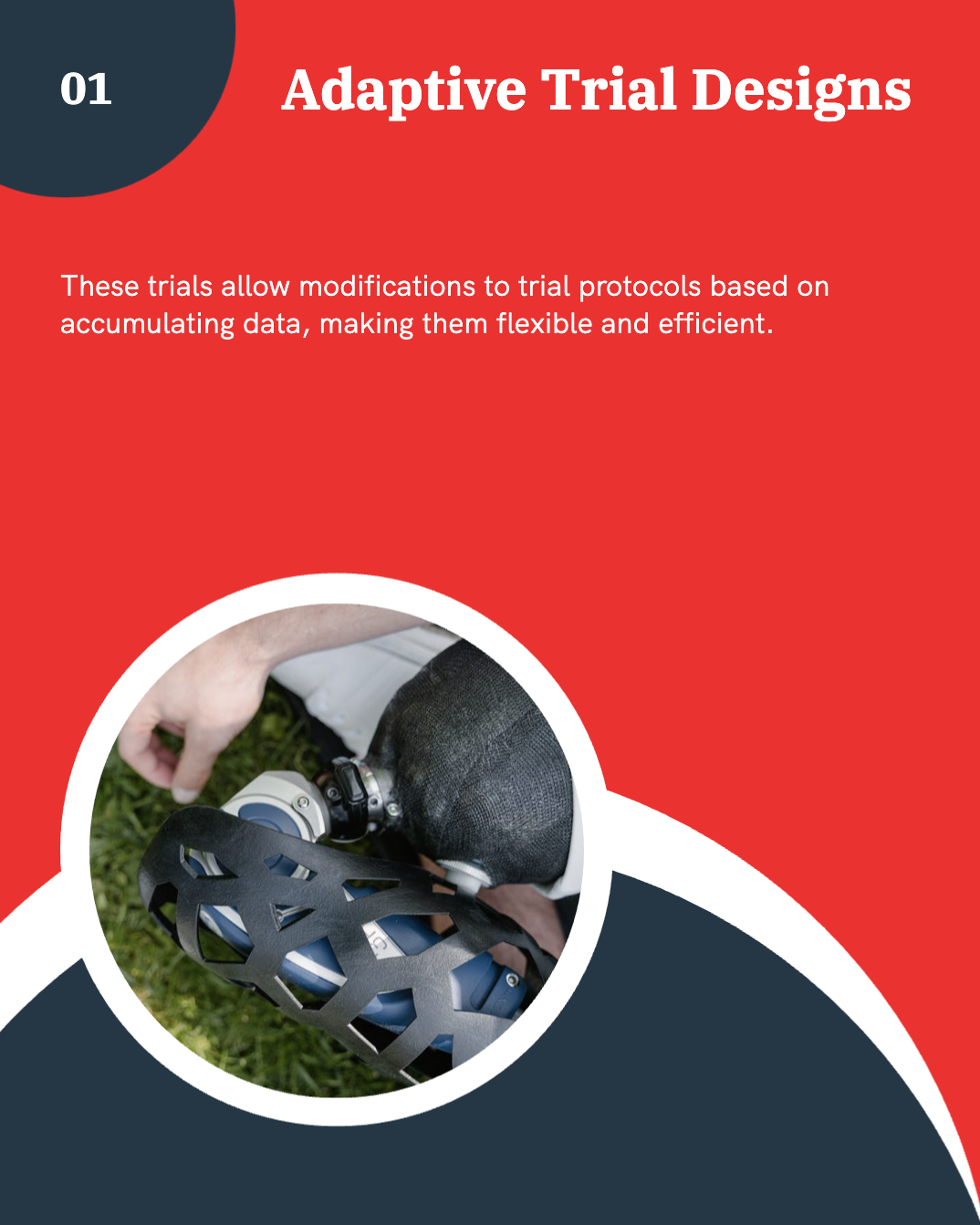
Key Types of Adaptive Designs in Oncology Trials
1. Bayesian Adaptive Designs
These designs incorporate prior data and continuously update probability models to refine treatment evaluation. They are particularly useful for dose-finding studies and optimizing patient allocation.
2. Seamless Phase 2/3 Trials
Rather than conducting separate phase 2 and phase 3 trials, seamless designs integrate both phases, enabling faster transitions and reducing redundant processes.
3. Response-Adaptive Randomization
Patients are allocated to treatment arms dynamically, favoring those showing greater efficacy while reducing exposure to ineffective treatments.
4. Master Protocols (Basket, Umbrella, and Platform Trials)
- Basket Trials: Test a drug across multiple cancer types with a common molecular marker.
- Umbrella Trials: Evaluate multiple targeted therapies within a single cancer type.
- Platform Trials: Continuously evaluate multiple treatments, adding or dropping arms based on results.
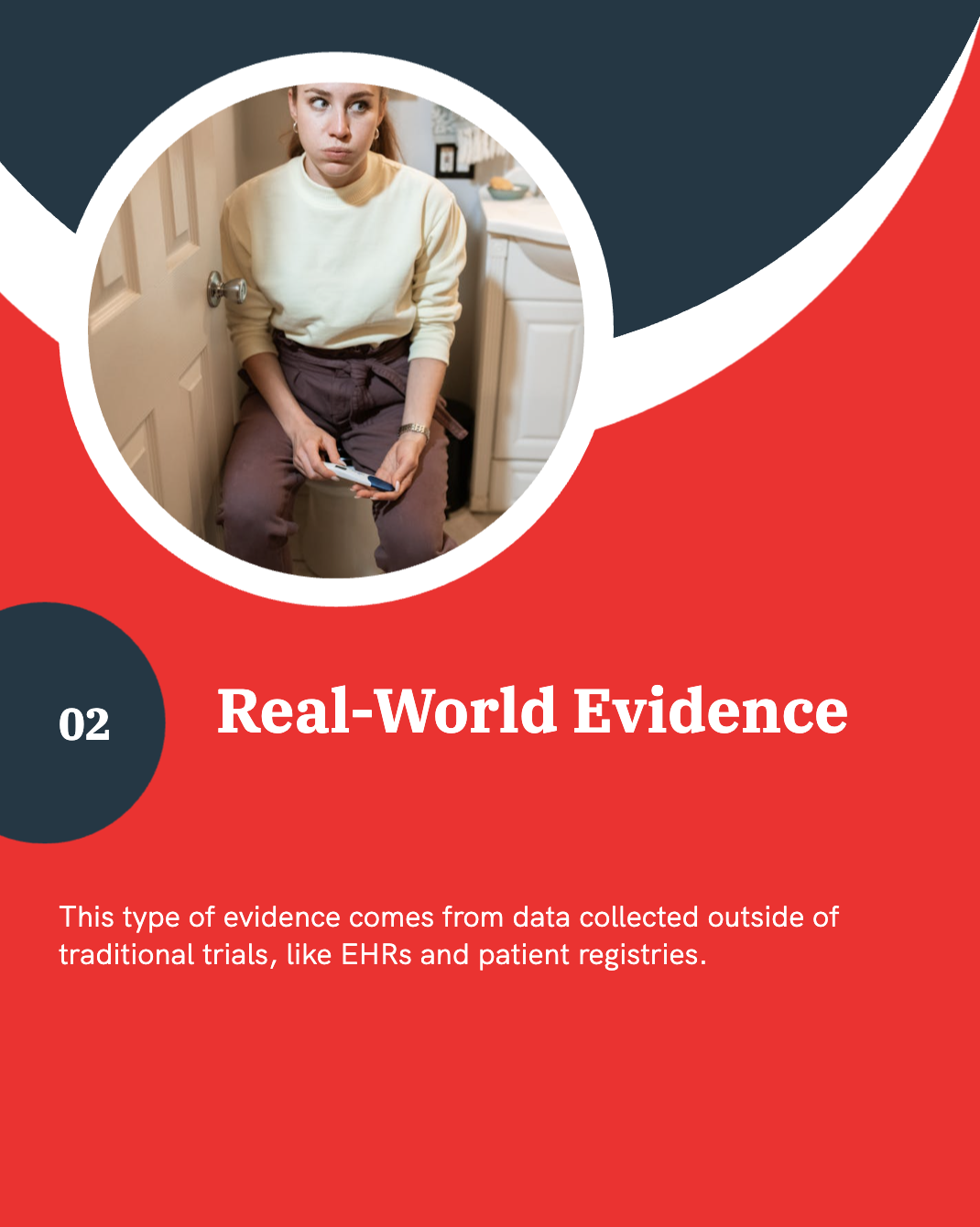
Real-World Evidence (RWE) in Oncology Trials
What is RWE?
RWE refers to clinical data collected outside traditional RCT settings, including:
- Electronic Health Records (EHRs)
- Patient Registries
- Claims Data
- Wearable Devices and Patient-Reported Outcomes
How Does RWE Complement Adaptive Designs?
- Faster Patient Recruitment: Uses existing databases to identify eligible patients
- Synthetic Control Arms: Reduces reliance on placebo groups by comparing experimental treatments with historical data
- Long-Term Safety Monitoring: Tracks patient outcomes beyond clinical trial periods
- Regulatory Decision Support: Provides post-market surveillance insights
Examples of RWE in Oncology Drug Approvals
- FDA’s Use of RWE for Expanded Indications
- Pembrolizumab (Keytruda) received accelerated approval for multiple cancer types based on biomarker-driven RWE.
- Flatiron Health and Roche Collaboration
- Used real-world oncology data to support drug development and regulatory submissions.
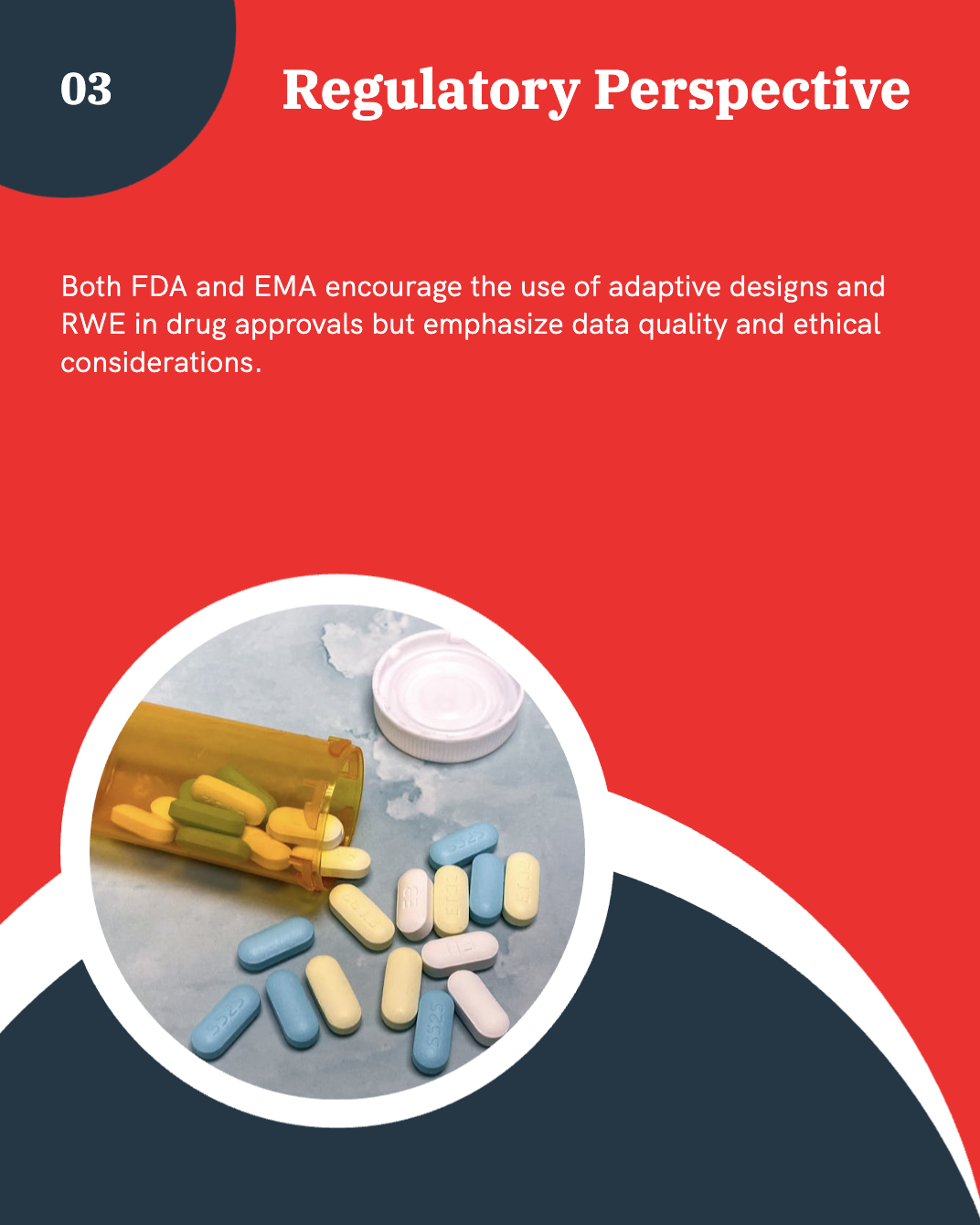
Regulatory Perspective on Adaptive Trials and RWE
FDA and EMA Guidelines
- The FDA's Adaptive Design Guidance (2019) supports adaptive trials while emphasizing transparency and pre-specification of modifications.
- The EMA's Qualification of RWE Methods encourages the use of high-quality real-world data in regulatory decisions.
Key Considerations for Regulatory Approval
- Statistical Rigor: Ensuring adaptive designs maintain validity and minimize bias.
- Data Quality & Standardization: Addressing inconsistencies in real-world datasets.
- Ethical Considerations: Ensuring patient safety with real-time monitoring mechanisms.
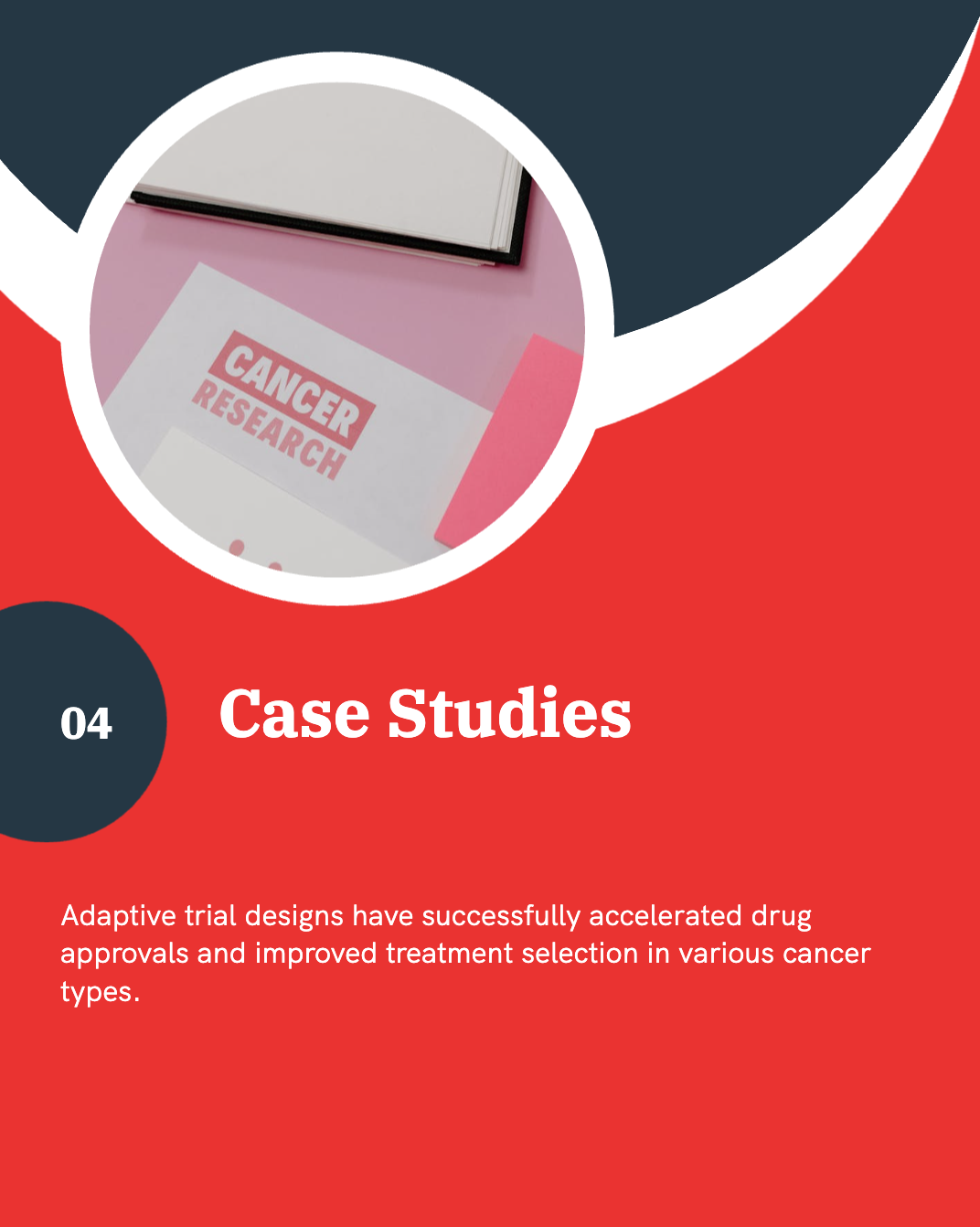
Case Studies of Successful Adaptive Oncology Trials
1. I-SPY 2 Trial (Breast Cancer)
- Used an adaptive platform design to evaluate multiple treatments simultaneously.
- Identified promising agents faster, leading to accelerated FDA approvals.
2. BATTLE Trial (Lung Cancer)
- Implemented biomarker-driven adaptive randomization.
- Improved treatment selection based on tumor profiles.
3. TAPUR Study (Targeted Therapy)
- Used RWE from patients receiving off-label treatments to assess effectiveness.
- Provided evidence for label expansions of existing drugs.
Challenges and Future Directions
Challenges
- Data Integration Issues
- Harmonizing RWE from diverse sources requires standardization efforts.
- Regulatory Uncertainty
- While agencies encourage adaptive designs, varying global regulations pose challenges.
- Bias and Confounding Variables
- RWE may introduce biases that need advanced statistical corrections.
Future Directions
- AI and Machine Learning in RWE Analysis: Enhancing predictive modeling for treatment outcomes.
- Decentralized and Virtual Trials: Increasing patient participation and data collection efficiency.
- Expanded Use of Synthetic Control Arms: Reducing the need for traditional control groups in trials.
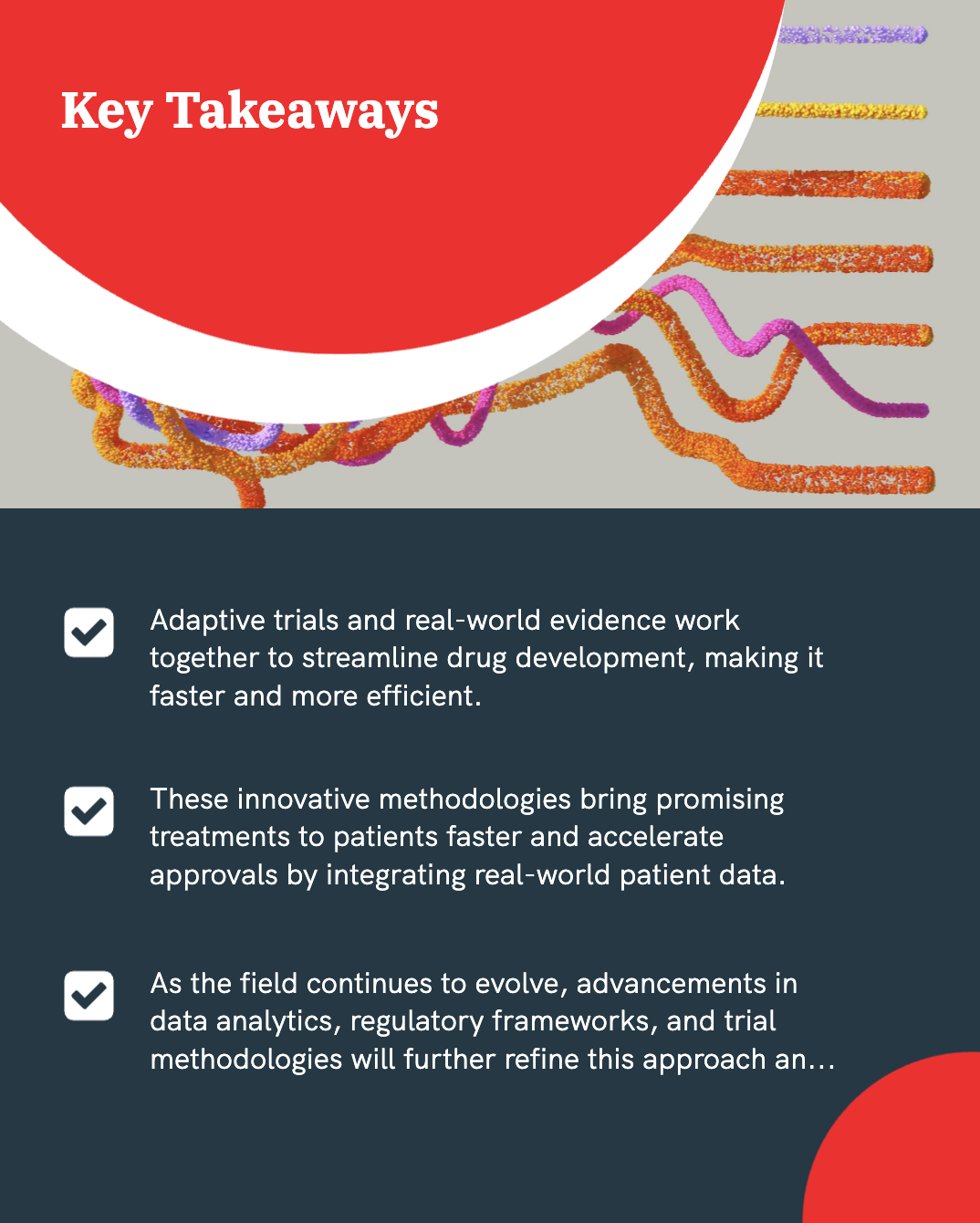
Key Takeaways
Adaptive trial designs, in synergy with real-world evidence, are revolutionizing oncology drug development. By enabling flexible trial modifications, accelerating patient recruitment, and integrating real-world data, these methodologies hold the potential to bring effective cancer treatments to patients faster. While challenges remain, ongoing advancements in data analytics, regulatory frameworks, and trial methodologies continue to refine this innovative approach, paving the way for a more efficient, patient-centered future in oncology research.
FAQs
- How do adaptive trial designs differ from traditional clinical trials?
Adaptive trials allow modifications during the study based on interim data, whereas traditional trials follow a fixed design without changes.
- What role does real-world evidence play in oncology trials?
RWE helps supplement trial data, improve patient recruitment, and support regulatory approvals by providing insights from real-world patient experiences.
- What are the main benefits of seamless phase 2/3 trials?
They eliminate redundant processes, accelerate drug development, and enable faster regulatory decisions.
- How does the FDA regulate adaptive trial designs?
The FDA provides guidelines to ensure adaptive trials maintain scientific validity, transparency, and ethical integrity.
- What are synthetic control arms, and why are they important?
Synthetic control arms use historical or real-world data instead of placebo groups, reducing the need for patients to receive ineffective treatments.
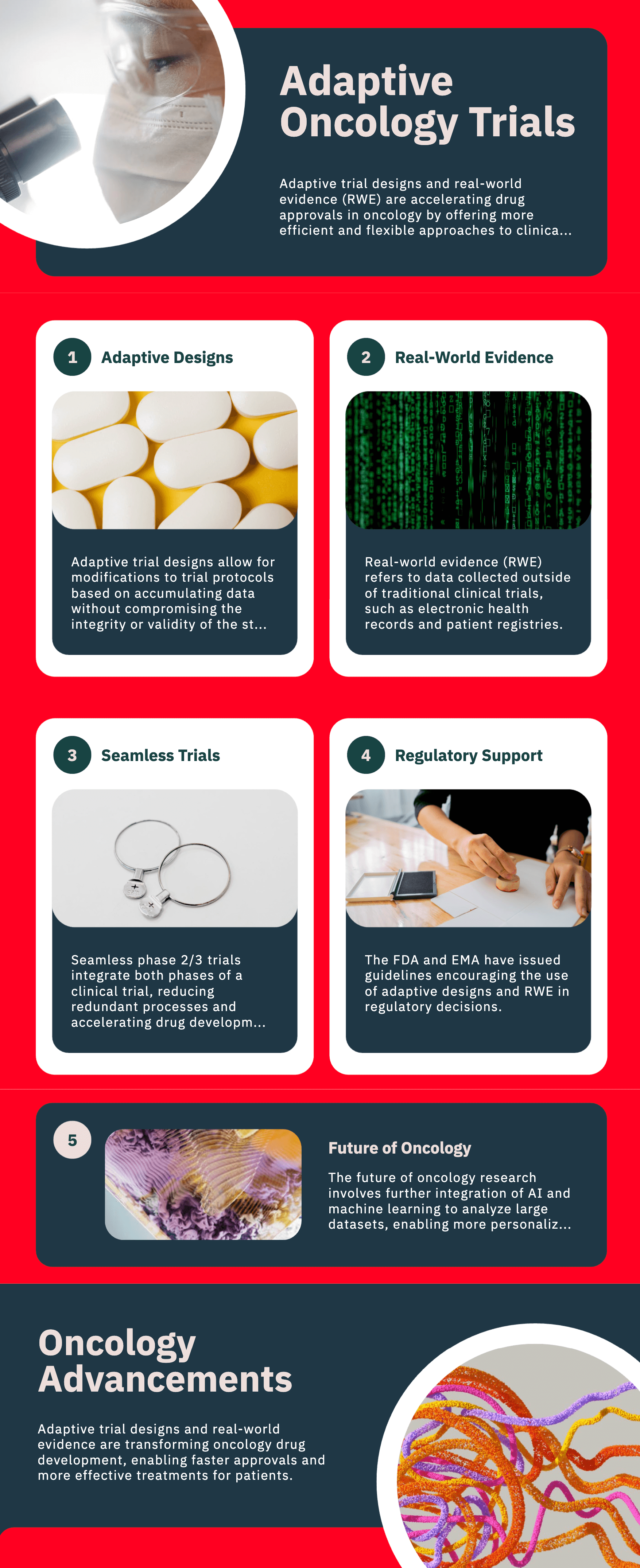 25.02.2025
25.02.2025






 25.02.2025
25.02.2025